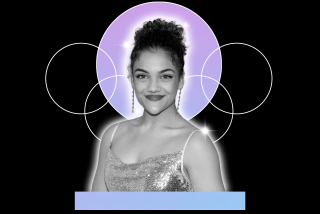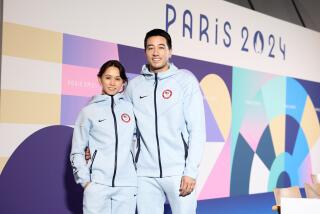Q&A: For Kayla Harrison, sacrifices paid off with judo gold
- Share via
When that Olympic gold medal for judo is hung around your neck, you know you’re the best in the world. Sometimes Kayla Harrison, 24, hated the endless training, missing movie nights and even the prom, but having the ability to visualize her success coupled with a clear objective to be the champion allowed her to persevere in London 2012, and perhaps again in Rio de Janeiro in 2016.
Judo seems an unconventional choice of sport for any child. What prompted your interest?
I started when I was 6 because my mother had taken judo in college and she wanted me to learn self-defense. She enrolled me in the local dojo, and I just really enjoyed it. Before that I played a little bit of T-ball and did a lot of dance, but from 6 years old onward, judo was my passion.
What’s it like going from a child’s passion to training for the Olympics?
The better I got, the more I had to sacrifice other parts of my life. I started doing school online when I was 16 and moved to Boston to train with the Olympic coaches. I never went to prom, and most nights when my friends were going to the movies I’d be working out at the club.
It is all-consuming. It’s something that doesn’t just take up your whole life but other people’s lives. There are townspeople who helped me along my journey. While the gold medal didn’t go around their neck, there is definitely a piece of it that belongs to each of them.
Describe the training regimen.
I was fortunate to be able to work one-on-one with a strength and conditioning coach three to five days a week. We also run sprints and intervals three to five days a week, and we do judo every single day.
Judo doesn’t have a season per se, but there are down times when I really need to focus on building my strength, but before competition I need to focus on conditioning and getting in as good shape as possible. Sometimes I do Olympic-style lifts, and others I do a lot of circuit training. It depends where I am in the year and what I’m peaking for.
Your sport is combat. I expect that takes a lot of brain training too.
Every athlete goes through that period of hating what they do and not knowing if it’s going to be worth it, but if you don’t have days like that then the ones that are really good aren’t sweet.
I do a lot of visualization and positive thinking as part of my routine. Even when I’m not physically training, I’m training my mind to believe that I am a winner and believe that I’m the best. I visualize myself winning tournaments and winning the Olympics. And at night I go home and cry because it’s been such a bad day and I feel like I can’t do it anymore, but then I go through my little mantra and I visualize and listen to the right song, and then I feel a little bit better.
We’re not far away from the next Summer Games. What are your plans?
I’m going for one more in 2016. The training is even more intense than it was before; I have a big target on my back now. I think 2016 is going to be my last Olympics. There are other things and goals that I want to accomplish with my life, so one more and I’m done. I’ll be ready to start a new chapter.
Fell is a certified strength and conditioning specialist and owner of bodyforwife.com.
More to Read
Go beyond the scoreboard
Get the latest on L.A.'s teams in the daily Sports Report newsletter.
You may occasionally receive promotional content from the Los Angeles Times.






